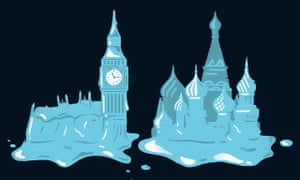Rafael Behr in The Guardian

With lighter diplomatic baggage, Boris Johnson might have been a hit in Moscow. The foreign secretary’s artfully dishevelled, pseudo-Churchillian kitsch is not to everyone’s taste, but it could work in the bombastic idiom of Russian politics.
But as Theresa May’s emissary to the court of Vladimir Putin later this week, Johnson faces a tough audience. May has accused the Kremlin of aggressively targeting an international order based on law, open economies and free societies. In a speech last month, the prime minister listed offences including territorial theft from Ukraine, cyber-attacks on ministries and parliaments, meddling in elections, and spreading fake news to sow discord.
Russian interference in British democracy is currently being investigated by the Electoral Commission and parliament’s culture, media and sports committee. The latter’s chair, Tory MP Damian Collins, has signalled that he doesn’t believe recent claims by Twitter and Facebook that Kremlin-funded efforts to boost Brexit in 2016 were negligible.
He is right to be sceptical. The tech companies have a record of stonewalling any suggestion that their business model has been co-opted for organised malfeasance. They have commercial incentives to duck moral responsibility for the sinister content shared on their networks. It is beyond doubt that Donald Trump’s presidential campaign had a hefty Russian boost. Facebook has removed tens of thousands of pages believed to be involved in sabotage of French and German elections. British ballots are unlikely to have escaped dirty money and molestation by troll battalions.
That doesn’t mean Brexit is a conspiracy that blew in on the east wind. Mistrust of the EU was not made in a factory outside St Petersburg. To connect tweets in Murmansk to a leave majority in Merthyr Tydfil misses the point about misinformation. The goal is not always to execute a specific outcome but to stoke existing tensions, nurture rage, exacerbate polarisation and shroud everything in such a fog of lies that truth becomes ungraspable. The purpose of fake news is to debase the currency of all news, and so undermine the foundations of pluralistic politics.
The advantage to Russia is in weakening western governments and their alliances. Putin despises Nato and EU influence in countries that were, until 1991, Soviet territory. He sees their sovereignty as fictions imposed by enemies. Undermining European and US resolve to uphold their borders is his goal.
There is a strain of Brexitism that is complicit in that project, regardless of whether leave campaigns knowingly or unwittingly took laundered roubles. Nigel Farage’s admiration for Putin is no secret: he has pushed the Kremlin line on Ukraine, preposterously depicting Crimea’s annexation as a defensive answer to EU provocation. He has described Russian military support for Syria’s murderous president Bashar al-Assad as a “brilliant” manoeuvre.
Putinophilia has the same cause as Farage’s Trump fandom. It is the nationalist’s fetish for a strongman, combined with nostalgia for the days when the world was run as a game between big countries using little countries as chips. It is unresolved grief at the UK’s 20th-century relegation from the ranks of imperial pawn-pushers.
That slow-burn trauma is analogous to the more sudden loss of status mourned by Russia, the reversal of which is Putin’s mission in life. During the cold war, British ideologues who swallowed a Kremlin agenda and regurgitated it as their own used to be called “useful idiots”. The difference now is they aren’t confined to the far left. Some of them are in government.
We may never know how much influence the Kremlin had in the referendum, but we can be sure its result was popular there
The Brexit delusion is that enslavement by Brussels inhibits our promotion back to the global power premier league. Boris Johnson is not immune to this fantasy. He would rather be a foreign secretary in the 19th-century style of Lord Castlereagh, carving out spheres of influence at the Congress of Vienna, than yawn through EU council meetings.
It is true that the EU empowers smaller countries. Witness the clout that Ireland has had in Brexit talks. But Britain has also benefited from aggregating its medium-sized might with Germany, France and 25 other nations. That is not a Brussels empire. It is a model of peaceful, collaborative power without historical equal.
May once understood this. In the referendum campaign she made a solid case for EU membership on the grounds that it could “maximise Britain’s security, prosperity and influence in the world”. When she now promises a “deep and special partnership”, she is not just talking about trade, she is pledging loyalty to European democracy as one of its few significant military underwriters. When the prime minister berates Putin for undermining institutions that uphold the rule of law, she is signalling strategic solidarity, not economic alignment, with the EU.
This is chasing a bolting horse when the stable door hangs off its hinges. We may never know how much influence the Kremlin had in the referendum, but we can be sure its result was popular there. Brexit has already fractured an alliance that will be hard to repair. May will never be a friend of Putin, but he doesn’t need her friendship when she is committed to a policy he would choose for her anyway.
No comments:
Post a Comment